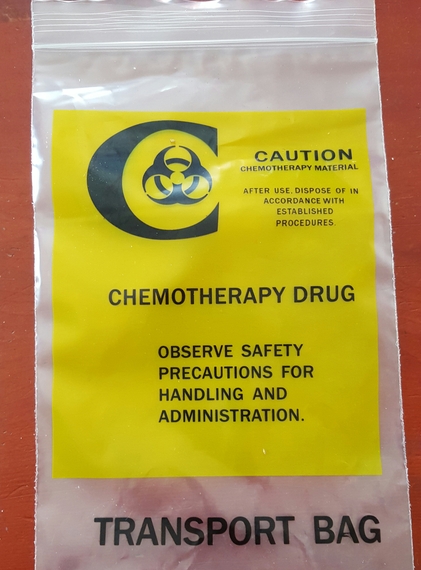Last week, after two weeks of appealing insurance company denials, I got a call from Fidelis that my daughter's latest oncology drug was approved. I was so effusively grateful to the Fidelis rep, that I'm pretty sure I freaked her out.
But she doesn't know the back story. She doesn't know that this is the third oral chemotherapy drug that my daughter will be taking since last June, or that each time we switch to a new drug, we go through the agonizing process of waiting and worrying about getting insurance approval. She doesn't know that with each subsequent scan that shows cancer progression, we are running out of options to treat my daughter's cancer in a minimally invasive way.
The targeted drugs that have extended my daughter's life cause few side effects, can be taken orally, and are more effective than the harsher chemotherapy she received a few years ago which didn't work at all. She needs them, obviously. So why is it so hard to get them approved?
A 60 Minute piece titled The Cost of Cancer Drugs sheds some light on that question. In this piece, Dr. Leonard Saltz, Chief of Gastroinestinal Oncology at Memorial Sloan Kettering, estimates that the cost of cancer drugs is roughly $100,000 a year. In fact, he made the decision not to include a new drug, Zaltrap, as a treatment option for his patients because it was more than double the price of Avastin, a drug which was equally effective and already on the market. This decision was revealed in an article in The New York Times and, shortly after, Sanofi dropped the price of the new drug by half.
Sanofi dropped the price of Zaltrap less than a month after the original NY Times piece was published. Does that imply that the prices for these much needed drugs are essentially arbitrary? I think it does.
I'm sitting here at the very bottom of the medical food chain wondering why it's not illegal for pharmaceutical companies to price gauge the products that save our lives. If the price of my daughter's medication wasn't so high, would we have the drugs in hand quicker? There's no one for me to ask because even though I'm technically the healthcare consumer in this scenario, I have no power.
The phrase "high healthcare costs" can seem like a talking point, particularly when people are referred to as "healthcare consumers" which is somewhat dehumanizing. Add to this the argument (mostly by pharmaceutical executives) that we (as consumers) aren't directly impacted by the high cost of drugs because insurance companies get the brunt of it, and we're basically expected to just live with it - live with intractable drug prices, live with insurance companies, drug companies and hospitals calling all the shots on pricing. We have to live with it because what's the alternative?
Don't get sick.
When my daughter's cancer was progressing last June, her oncologist attempted to get her first targeted oral chemotherapy drug approved from our insurance company. That first drug offered a lot of hope. It was really ground breaking. The technology involved in identifying how this drug could specifically help my daughter was brand new. It literally did not exist two years ago and neither did the drug. But from the time the oncologist decided to try this miracle drug to the moment it arrived at our door, two months passed.
Two months that the tumors had time to grow and spread.
Two months of constant phone calls, faxing paperwork, and staying up late at night wondering if it would be approved, if it would ever arrive.
Ultimately it was approved and it even worked -- until it didn't anymore, which is the sad story of many cancer drugs. My daughter was switched to another oral chemotherapy drug around December. It took about three weeks to get the drug (three more weeks of waiting, worrying and wondering if the cancer was growing). The pharmacy refused to ship more than 15 pills which apparently was standard practice because they are that expensive and they don't want any to go to waste (the oncologist was still trying to figure out the dose).
The new drug kept her somewhat stable for about six months, but now her cancer is progressing again, so she's in the midst of being switched to a different targeted drug which is manufactured by Pfizer. We started the process of requesting the drug 14 days before we actually received it.
Once again I'm left wondering why this is so hard. Is there an executive sitting in a big office at Pfizer who has any idea what it means to have a child with cancer? What kind of insurance does he have? Can he think further than his bottom line? When they set these prices on their miracle drugs, do they consider that if the price is too high, people will die? If I can't afford a therapy, treatment or procedure, it essentially doesn't exist. Not for me. Not for my daughter.
And what about the approval process itself? My daughter's drug was denied twice by Fidelis. Each denial costs us more in time. Why do they have the luxury of mulling this over when each day without treatment is a day that could make my daughter sicker?
I am glad we got the drug. I truly am. I am glad it exists. But I have never felt smaller or more helpless. That's what "high healthcare costs" mean to me. They are real. They are insurmountable, and you know what? I'm tired of being a talking point.
